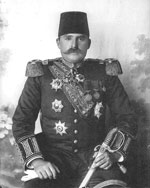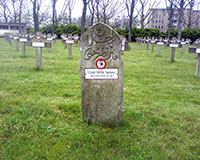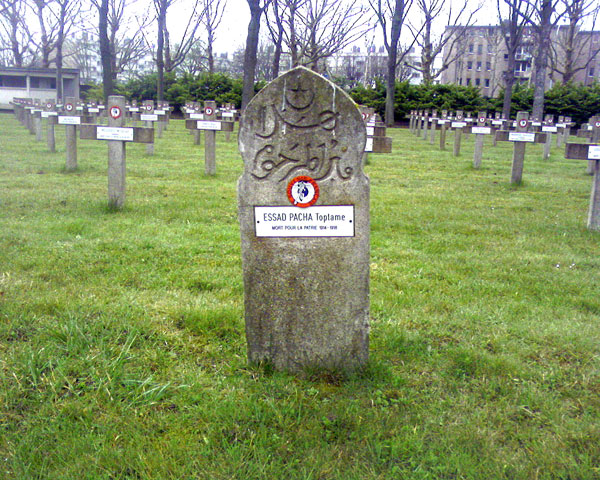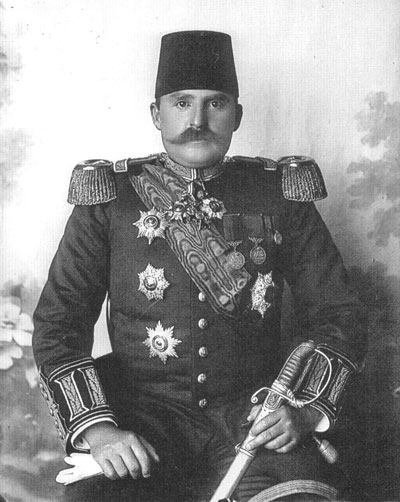| | Robert Elsie | AL Art | AL History | AL Language | AL Literature | AL Photography | Contact | |
Robert Elsie
Texts and Documents of Albanian History
BACK | AL History

![]()
Essad Pasha Toptani.
1919
Essad Pasha Toptani:
Memorandum on AlbaniaEssad Pasha Toptani (1863-1920) stemmed from a wealthy landowning family from the Tirana region. He was early to gain a reputation as an unscrupulous opportunist. In 1908, he joined the Young Turks and became a member of the Turkish parliament. He is accused, in April 1913, of having assassinated Hasan Riza Pasha, commander of Shkodra, and of turning the fortress of Shkodra over to Montenegro, in order to gain Montenegrin support for his rule in central Albania, his traditional power base. This was in contradiction to the decision of the Conference of Ambassadors in London which had assigned Shkodra to Albania. On 16 October 1913, to frustrate Ismail Qemal bey Vlora, the power-hungry Toptani set up a rival government based in Durrës, called the Republic of Central Albania. He reluctantly stepped down when forced to by the Great Powers on 1 February 1914, being given as a consolation the right to lead the Albanian delegation which travelled to Germany to offer the Albanian throne to Prince Wilhelm zu Wied. Relations between the prince and the scheming Toptani, now minister of war and minister of the interior, soon soured and he was banned from the country in May 1914 when armed nationalists under a Dutch officer arrested him for conspiracy. From exile in Rome, he maintained close links with the Serb and Montenegrin governments. In October 1914, Toptani returned to Durrës via Serbia. When Austria-Hungary occupied much of central and northern Albania, Toptani fled to France and later to London, where he presented himself as the national representative of Albania. He was assassinated in Paris on 13 June 1920 by Avni Rustemi as he was leaving the Hotel Continental in the rue de Castiglione and is said to be buried at a Serbian military cemetery there.
In this memorandum, the ever-scheming Essad Pasha endeavours to persuade the Paris Peace Conference of 1919 that he is the sole legitimate rule of Albania.
Memorandum on Albania
At the end of the Balkan Wars, the Great Powers, faced with the problem of solving the Balkan Question, found the moment suitable for occupying Albania, the turbulent and chronic history of which had given rise to much unease over the past fifty years. After long negotiations, the Ambassadors, gathered in London and acting on behalf of and upon instructions from the governments they were representing, created Albania as an independent, autonomous and hereditary principality and, several months later, chose Prince Wilhelm zu Wied to mount the new throne (Conference of London 1913).
At that moment, two governments shared the administration of Albania: one in Vlora under the presidency of Ismail Kemal Bey and one in Durrës headed by myself. The former was the personal creation of a number of men, whereas the latter emanated from the will of the people freely expressed at a meeting in which the representatives of all the districts of central Albania voted freely.
Such was the situation when the International Control Commission, second emanation of the Conference of London, began its functions (October 1913).
Following the revelation of the Young Turk plot to foster a Muslim uprising in Albania against the decision of the Great Powers and in favour of Izzet Pasha, Ismail Kemal Bey, whose connivance had been officially confirmed, was obliged to resign and leave the country. The International Control Commission took over the administration of business in that part of Albania. Wishing to provide the country with one sole administration and to overcome all possible scission, it appealed to my sense of devotion to my country and asked me to resign from my functions. Although my position was based on the freely expressed will of my fellow citizens, I did not hesitate to listen to the request which in my view represented the will of the six Great Powers and acceded to it, after the said Commission proposed putting me at the head of the Albanian delegation formed to travel to Germany to offer the throne to the prince who had been selected. The official documents prepared by the Commission pay homage to what I had accomplished during my presidency and to the patriotism of which I had given proof. I wish to remind you, gentlemen, these events will enable you to understand that, since the first day the Principality of Albania was created, I have had but one desire: to do nothing which might compromise the activities of the Powers. At the time the Commission charged me with travelling to Neuwied, I was well aware that the Muslims, who constitute the vast majority of the population, were discontent with the choice made by Europe, but I was also aware that my influence and authority, deriving from my capacity as head of the main and oldest family in Albania, would not only silence my fellow Muslims, but make them accept the Prince whom I was more or less to impose upon them. Without exaggeration, it can easily be said that the decision of the Control Commission relied on the fact that I was the only Albanian figure whose intervention in this matter could calm popular discontent. I thus accepted, although I was not unaware that I had set myself up as an opponent to the will of my fellow Muslims and that this stance would give rise to a certain hostility towards me.
Prince Wied landed in Durrës in February 1914. His ignorance of the country, his customs and habits, his servility towards certain influences, and the lack of tack he showed during his first days in the country reinforced the latent discontent. A few weeks after his arrival, revolution broke out, which obliged the European Great Powers to send an international fleet to the port of Durrës, the presence of which, it was hoped, would stifle the discontent. Unfortunately, cowing to the diplomatic representative of Austria-Hungary, the Prince committed an act which I would not deign to comment upon since it was committed against my person. In the night of 19 May 1914, a battery deployed during the night in the gardens of the palace opened fire on my house in the centre of town. At the same time, some volunteers, known for the Austrophile sympathies, surrounded my residence and their leader, the Dutch officer charged by Europe with organizing the gendarmerie, attempted to take me prisoner. At the time, I was Minister of War and of Internal Affairs, and was interim Prime Minister. I consented, but on condition that the Italian Minister to the Albanian Court take charge of me. Under such circumstances, I was obliged to leave my country and take refuge initially in Rome and then in Paris.
This incomprehensible act doubled the discontent of the Albanians, whose revolt spread even further. The repeated intervention of the members of the Control Commission did not suffice to calm the spirits. Durrës was under siege and was cut off from the rest of Albania, and the authority of the Prince extended no farther than two or three kilometres from Durrës.
Such was the situation when the World War broke out. Four weeks later (September 1914), Wilhelm zu Wied gave up and departed on a yacht provided by the Italian Navy and journeyed to Venice. All the members of the cabinet followed him. I was in France at the time. Realising that my country would be called upon to play a major role in the hostilities, and knowing it would fall under influences of which I disapproved, I left Paris and, without losing any time, returned to Albania via Athens and Nish, thus from the start giving proof of the position I was to adopt towards the Central Powers. On arrival in Dibra, I enrolled over 10,000 Albanians within a few hours and, at their head, I entered Durrës without firing a shot. There I was acclaimed by the population and welcomed by the foreign community with a marked sign of real satisfaction. Twenty-four hours later, the Senate unanimously elected me as head of the government, a move of which all the Powers approved.
The country was divided into two camps at that time: on the one hand were the supporters of Austria and on the other were those in favour of the return of Turkey. I actively opposed both sides and I was happy to be able to restore order, peace and security. My conduct received the approval of and congratulations from those members of diplomatic corps who had remained in Albania following the departure of the Prince. The archives of the governments in question can give proof of this if necessary.
All the time I was busy with the domestic situation in the country, I did not lose sight of the role I would be called upon to play in the war which, though it had just begun, was such that one could see there would be many years of bloody fighting before us. A mere hour after my return to Durrës, the diplomatic representative of Austria-Hungary, relying on the friendship we had enjoyed for several years, made me some very enticing offers on behalf of his government if I would only agree to give my support to the Central Powers. I categorically refused these propositions he made on several occasions. A few weeks later - at this juncture I would ask you, gentlemen, to be aware that I am referring to October 1914 - the diplomatic agent of Bulgaria, informing me of the decision taken by his country to oppose the Entente, begged me to take up the gauntlet against Serbia, too. Once again, I refused categorically. At the same time, I informed the French minister of Bulgaria's intentions and these, as far as I know, were communicated to the Minister of Foreign Affairs of the French Republic.
My conduct was dictated by the spontaneous decision I had taken in the first days of the war, the decision to link my country's fate to that of the Allied Powers who had solemnly recognized the right of small nations to run their own affairs. I acted at the time with a certain degree of courage, if I may be permitted to say so, since the military situation of the Allies was not favourable The victory at the Marne had not yet occurred and timid spirits surrounding me were not predisposed to the side I had taken. But I was deterred neither by their pessimism nor by any doubt about the ultimate triumph of the Allies.
I declared war on Austria on behalf of the government I was heading. I would like to recall here that this state of war was recognised by the Pula Tribunal in a decision which legitimized the capture of a number of Albanian sailboats, based on the fact that Albania was at war with Austria.
I was soon faced with a new domestic insurrection. Turkey had just taken sides with the Central Powers and declared holy war. The vast majority of the Albanian population, being Muslim, as I noted above, would obviously be influenced by this declaration which the stipulations of the Koran forced them to obey. I opposed this with all my might, though I am myself a Muslim. A popular uprising declared itself against me and, at the same time, the Military Court in Constantinople condemned me to death and informed the whole Islamic world of the sentence. But I was dissuaded by neither.
With my energy and the measures I took, I finished by getting the upper hand over the movement which, had it spread, would possibly have had terrible consequences and compromised the work I had begun. During the repression, I was able to seize thirty thousand rifles and clandestine ammunition smuggled into the country by Austria. Had these weapons remained in the hands of the insurgents, they would certainly then have been used against Serbia. My action eliminated this danger. In addition, on the day when Serb troops, after some amazing victories, gave way to enemy forces which outnumbered them and sought refuge in Albania from enemy pressure, I was more than happy to be of service to them, which for me resulted not only in words of thanks from the Allies, but also high distinction in my being awarded the national orders of France and England. A few weeks later, I facilitated the transfer of these troops to the ports they were destined to use to get to Corfu. There is no need for me to insist on the importance of my role in these events. Had someone else been at the head of the Albanian Government, the Serb army, wearied by forced marches through the snow-covered mountains, deprived of food, disbanded and harassed by Austrian partisans, would easily have fallen victim to the enemy and have deprived the Entente of assistance it would later need.
I should like to add at this juncture as information that the Prince Regent of Serbia deigned, in the course of an official reception, to proclaim aloud that his country would never forget the assistance I provided during those tragic events. France, for its part, spoke highly of me, too. It is not my intention, in bringing up these events again, to heap praise upon myself, but simply to make clear the extent of the support I provided.
Continuing my work, I put myself at the complete disposal of the Italian high command to collaborate in the defence of all the region of Durrës against Austrian troops. Our efforts were not crowned with success for reasons I do not wish to elaborate upon here. I was obliged to abandon my country during the enemy advance, when all resistance had become futile. I agreed to go to Italy after the Italian diplomatic representative gave me his official assurance that his government was acting on behalf of the Entente. I was, however, aware that another Power had already taken the requisite steps to ensure my passage and that of my soldiers to Corfu where, reorganized like the Serbs, we were to be sent to the Eastern front. It is due to the support I offered in the defence of Durrës that the Italian Government awarded me the Great Ribbon of Saints Maurice and Lazarus.
I was received in Rome with great honour by the Prince Lieutenant, the Prime Minister and the Minister of Foreign Affairs, and all three of them assured me that I would be considered and treated as the president of the de facto government. I would prefer not to speak about the negotiations underway between the government and myself and the reasons hindering their success.
After the failure of the talks, I withdrew to Paris. There, in the month of August 1916, as a result of negotiations which are so well-known that there is no need for me to comment on them in detail, I was sent to the Eastern front, and my soldiers who were transported to the island of Ponza during my departure from Albania, were shipped to Salonica on board a French vessel. Upon their arrival at their destination, the men were placed until the orders of the French Military Mission and sent to a nearby sector in Albania. For almost two years, they took part in all the military operations and, in September 1917, collaborated with their French comrades in the Starova offensive in such an efficient manner that in one sole encounter, they took prisoner more Austrian troops than they had themselves. The various French officers who commanded them paid tribute to their courage and disregard for death. My troops remained on the front until the armistice with the Bulgarians.
From the above, it is evident that Albania, whose president I was by popular will, took part in the war from the very start for the Allied cause and, as a result, had the privilege of being invaded and ravaged by enemy barbarians. It suffered as much as the other countries did and, like them, it has the right to raise its voice to demand the right to rule itself. There is no need for me to mention what the situation might have been like, had Albania opted to support Austria-Hungary: Serbia would have been defeated, the Eastern front would have been deprived of desperately needed support and Albania could have cut off the communications routes through Santi Quaranta (Saranda), etc., etc. Under such conditions, have I not the right to be proud of the role, modest though it may have been, which I played in the course of events that led to the triumph of the Allied Powers?
My Government functioned in Salonica while my troops were fighting on the front. Since no elections have been held since 1914, no one, in my opinion, can deny me the title of president of the Albanian Government, elected by the free will of the people. The national flag, replacing the one brought by Prince Wied, flew on the government palace in Salonica and took part in official ceremonies alongside those of the Entente powers. In addition, France, Serbia, Greece and Russia maintained their diplomatic missions with this government, and I was in constant official contact with them. Under such conditions, I do not believe anyone could doubt the existence of an Albanian Government under my presidency.
One is rather surprised to see a so-called delegation headed by Turkhan Pasha claiming to speak on behalf of Albania at the Peace Conference. Almost all the members of this delegation, having followed Wilhelm zu Wied into exile, settled in Switzerland and spread shameful propaganda against the Allies, not only in Europe, but also among the Albanian colonies in the United States. No one can deny this fact, which has been proven in a number of well-known documents. Other delegates have recently arrived to join them. Having remained in Albania throughout the war, these nouveaux riches were faithful collaborators of the Austrians.
The situation is thus evident: on the one hand stand men of no authority or power who have proven themselves to be adversaries of the Entente and have opposed it, and on the other hand stands the head of a government who, in the contrary, remained faithful and loyal to the pledge he made spontaneously in the early days of the war, at a moment when, if I may repeat myself here, the critical military situation of the Allies could have brought about a different decision.
What is Albania, represented by me, now calling for?
Without wishing to review the whole history of my country, I think it useful to recall that, since ancient times, Albania has struggled against all invaders in order to maintain its national character, its language, customs and habits. It was invaded time and again over the centuries but was never subjugated. After centuries of struggle, and thanks to the Great Powers, it finally achieved the independence it had always longed for and, though diminished by the territories taken by its neighbours, it gratefully supported the decision of the Conference of London. In order for it to be able to take up its position among the other Balkan States, to develop economically, to provide itself with a modern administration, to organise and to evolve, the Conference of London created an international organism for it, the efficiency of which soon became apparent and which would have made substantial progress, had the World War not intervened and impeded its work. This International Control Commission promulgated a statute, drafted by men who knew the country well, which could have proven extremely useful. It was approved by the Albanian Government and was awaiting ratification by the six Great Powers.
On behalf of Albania, I call for adherence to the decisions of the Conference of London, with one requisite modification today: the exclusion of the German and Austrian representatives from the Control Commission and their replacement by a delegate from the United States.
At the start of 1918, Bolshevist newspapers published the text of a secret accord signed in London in April 1915 by France, Great Britain, Italy and Russia, which would give Italy a privileged status in Albania and would alter the borders in favour of the country's neighbours, as they had been fixed in 1913. If this text of this accord is true, Albania, now further diminished in territory, will have to be placed under Italian protection.
Grave of Essad Pasha Toptani
in Thiais near Paris
(Photo: Robert Elsie, March 2011).
I do not intend to discuss the pros and cons of this decision, but I cannot help noting that, on the one hand, the signatory Powers gained territory which did not fall to the enemy and, on the other hand, they would be punishing Albania for siding with them in the first place. My Government had indeed joined the Entente six months before this secret accord was signed, even though the Power now to reap the benefits of my country's future was still hesitating in its own decision. Be this as it may, I regard it as my duty to draw to the attention of the Conference the danger involved in this decision. History, in its impartiality, will prove that at no time have the Albanians ever accept the yoke which others tried to place on them. In 1878, they took to arms against the decisions of the Treaty of Berlin to dismember their country and, to a certain degree, they received justice. During the five centuries of Ottoman domination, their uprisings proved to Europe that Albania would never consent to being Ottomanized. This is all the more remarkable because, despite the overwhelming Muslim majority in the country, the Albanians were too independent-minded to admit the sovereignty of even a Muslim Power. When the country demonstrated in 1914 against Prince Wied, this was not so much against him as a person but against the decision to impose a foreigner of another religion than that of the great majority. Under these conditions, the decision of the Powers, who have now come together to assure the world a peaceful future would have grave consequences if it involved any tutelage for Albania. If they were, nonetheless, to decide that Albania is not yet in a position to administer itself and that it needs to be supervised, the Control Commission, under the above-mentioned conditions, would suffice to give Europe all the guarantees it needs. I can assure you that, composed as it is by delegates of the Allied and associated Powers, the Commission would be welcomed with gratitude by Albanians of all religious affiliations.
Gentlemen, I have too much confidence in your spirit of equity and in the justice of my cause and that of Albania to doubt for a single moment the nature of the decision you are about to take.
Essad
President of the Albanian Government
Paris, 16 April 1919
[Mémoire sur l'Albanie, in: European War 1914, 1919. Translated from the French by Robert Elsie.]
TOP


